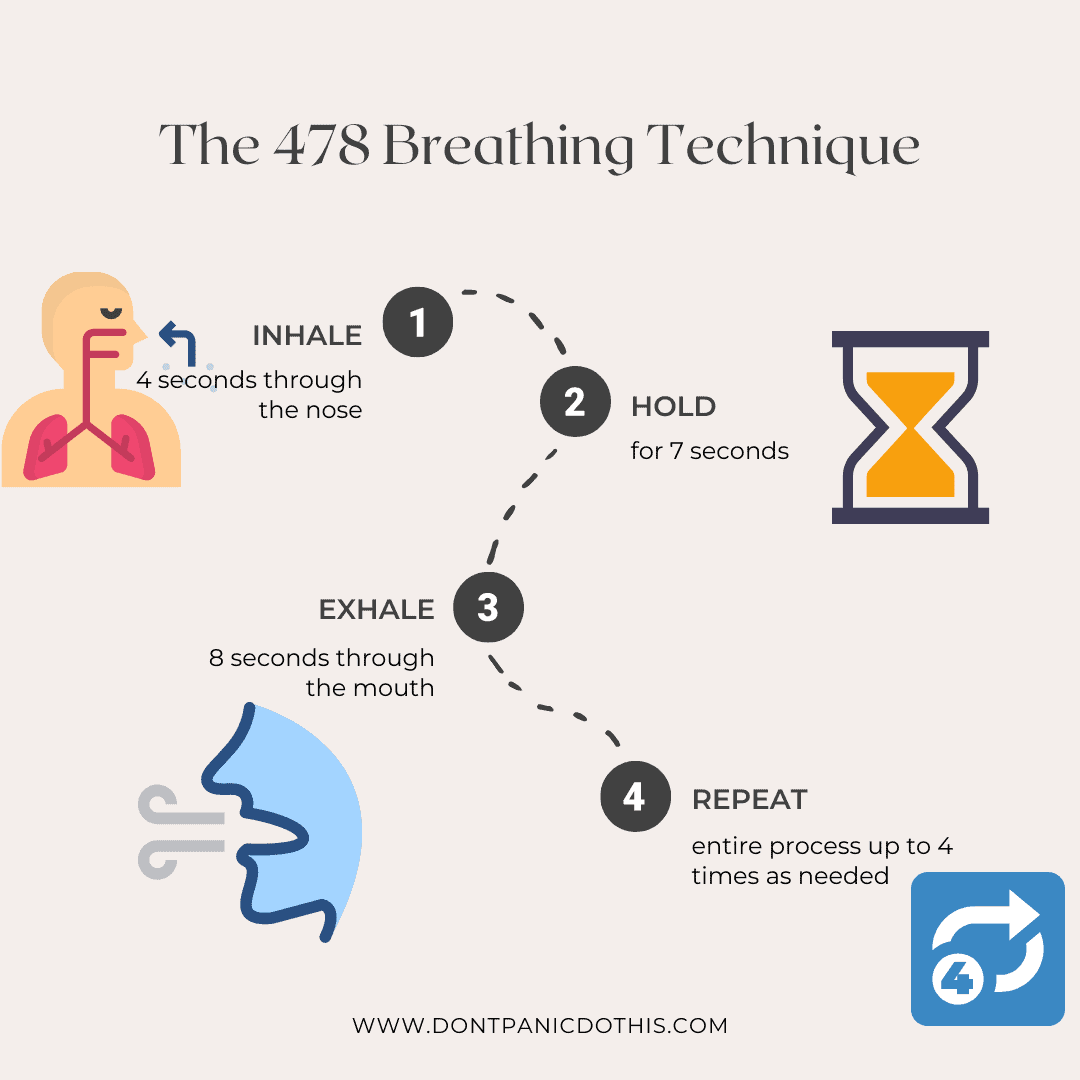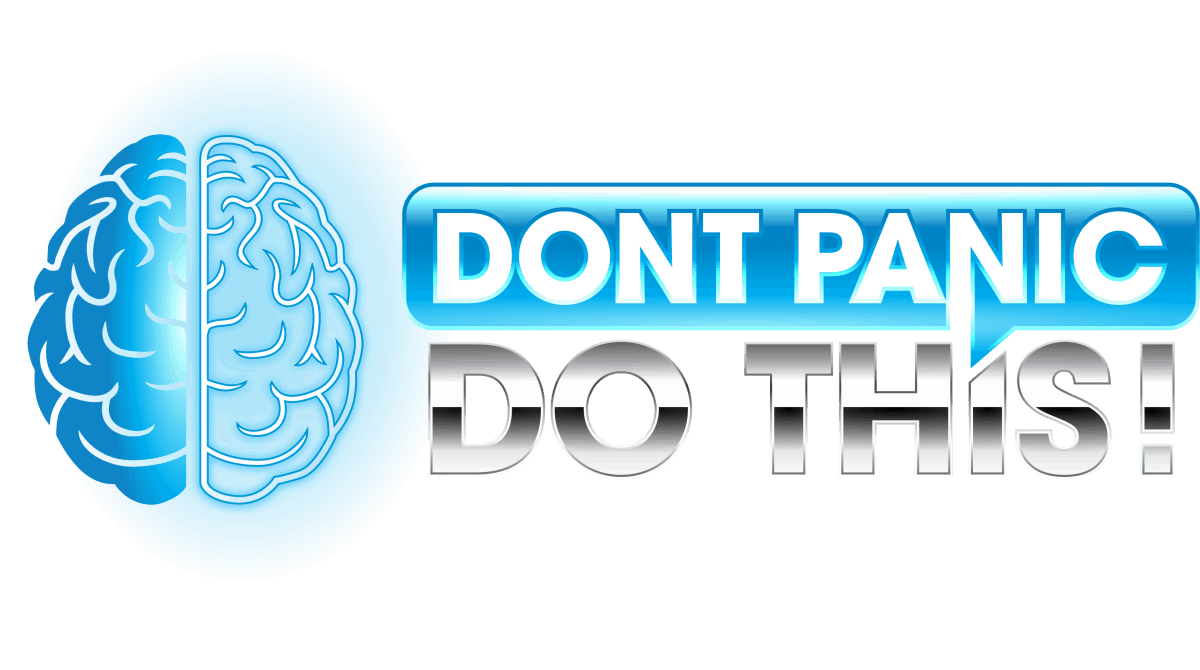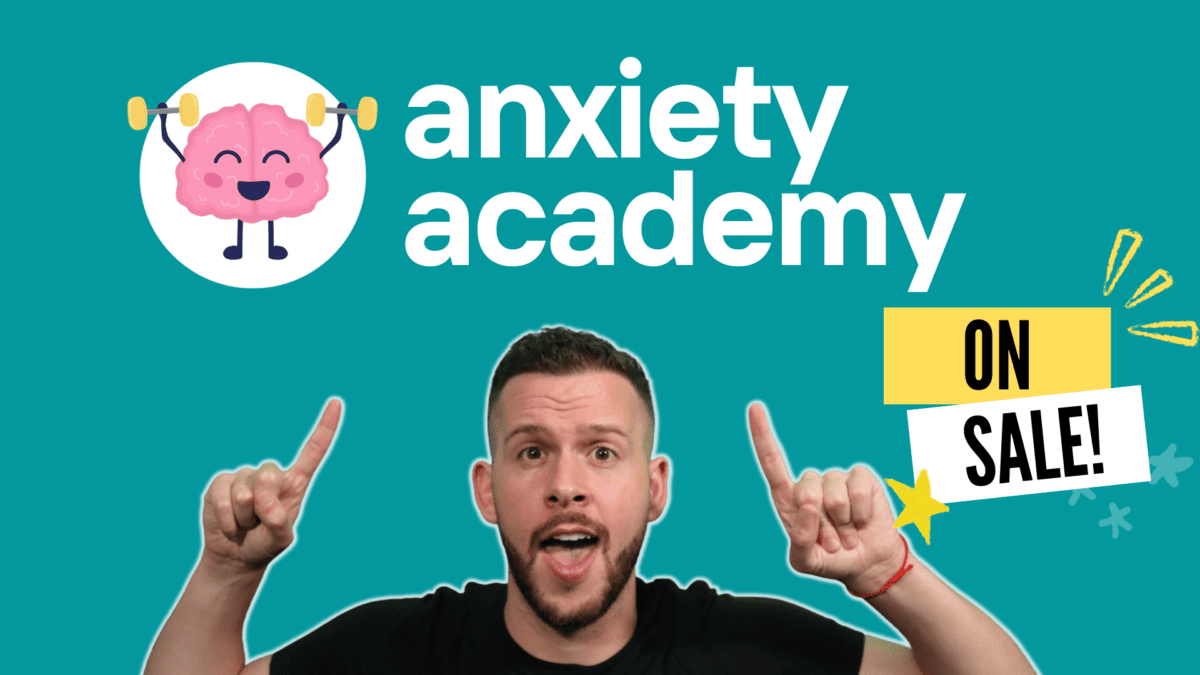For many people, anxiety and panic attacks are an inconvenient and terrifying reality. During a panic attack, we often fear we are going to die or lose control completely. When our anxiety reaches peak levels, it’s important that we know how to stop a panic attack.
There are many ways to stop a panic attack. Methods for stopping a panic attack can involve a combination of action, mindset adjustments, breathwork, visualization, or meditation. What works for one person may not work for the next, so it’s important to experiment and find the best method to stop your panic attacks.
Stopping a panic attack can seem a bit overwhelming, but these methods should help!
(If you find these short methods helpful, check out this book to learn over 100+ more detailed methods for stopping panic attacks and anxiety!)
Beginner Methods:
How to Stop a Panic Attack
Who These Are For: Anyone who has recently had their first panic attack. At this stage, panic attacks can be extremely frightening and confusing. Fortunately, learning the basics about what panic attacks are and how to stop panic attacks can go a long way.
1. Read and Learn About Panic Attacks
There’s no way around it: Panic attacks and anxiety can be scary. Yet many people never take the time to learn about their panic attacks, or to truly understand anxiety. Take some time to read up on what panic attacks are, why we experience them, and how they can be prevented. Remember: Knowledge is power. Don’t let a fear of the unknown worsen your anxiety.
2. You Cannot Die From a Panic Attack
Here’s a fun fact for you: You cannot, and will not, die from a panic attack. During a panic attack, our “fight or flight” response is activated. This makes us feel, on a physiological level, that our life is in danger. While it can be extremely uncomfortable, we are never actually in any real danger. Continually reminding ourselves of this fact can help us to regain control when our brain starts shouting doom and gloom.
3. This Will Be Over in a Few Minutes
Here’s a fun fact for you: You cannot, and will not, die from a panic attack. During a panic attack, our “fight or flight” response is activated. This makes us feel, on a physiological level, that our life is in danger. While it can be extremely uncomfortable, we are never actually in any real danger. Continually reminding ourselves of this fact can help us to regain control when our brain starts shouting doom and gloom.
4. Spark Up a Conversation
Talking to a friend, or even a stranger, is a great way to end a panic attack. The flow of a casual conversation can help to reset our breathing to a more natural pace. Also, being engaged in a conversation can help to ground us back in reality, as we now have something else to occupy our racing thoughts. Best of all, you will not be going through this alone.
5. Slow Your Breathing
During a panic attack, we tend to hyperventilate, or over-breathe. While it may feel as though we are not getting enough oxygen, the reality is that we are usually taking in too much oxygen. Rapid, shallow breaths can throw us into a state of respiratory alkalosis, during which we are actually in short supply of carbon dioxide; this makes our anxiety feel even worse. Grab your body’s manual override controls by consciously slowing your breathing. Slow, deep, diaphragmatic breaths will help your anxiety pass more quickly.
6. Visualize the Best Outcome
Anxiety tends to bring out the worst in our expectations. We begin to imagine the worst possible outcome to any given situation, filling us with a sense of dread and fear. To combat these feelings, try and visualize the best possible outcome instead. Rather than picturing yourself failing or embarrassing yourself, visualize yourself succeeding and accomplishing something great.
7. Practice Mindfulness Meditation
Mindfulness meditation isn’t just a spiritual practice reserved for monks and hippies. It’s a mental practice that helps to build focus and discipline. Meditation is commonly used and recommended even by CEOs and the military. Best of all, getting started is fairly simple. In a nutshell, mindfulness meditation involves bringing your attention to your thoughts, and reeling your thoughts back in to a central focus anytime they start to wander. It’s not hard to imagine why this could be useful for anxiety sufferers!
You can learn more about meditating for anxiety relief here.
Intermediate Methods:
Stopping a Panic Attack Now
Who These Are For: People who have been having panic attacks for a while. You know what panic attacks are and understand they’re not dangerous, but they're still ruining your life. These methods for stopping panic attacks focus on distraction to help you quickly regain control.
1. Change Your Environment
Sometimes the quickest panic attack fix is simply moving around a bit. When this is the case, changing our environment can have a profound effect on helping us calm down. If you’re feeling anxious indoors, maybe stepping outside to get some air could help. If you’re feeling anxious outside, maybe relaxing inside will help. If you’re feeling overwhelmed in a social situation, maybe you simply need to be alone for a bit. Whatever environment you’re in while feeling anxious, consider moving somewhere else and seeing if it helps. If all else fails, you can always relax and unwind by taking a nice, warm bath.
2. You Have Beaten This Before
Chances are this is not your first panic attack. If that’s the case, you should already know the drill by now. I’m going to feel super scared for a few minutes, and then it’s going to pass. Maybe this fact isn’t ideal, but it’s certainly better than the state of bewilderment you were probably in trying to stop your first panic attack. Remember, you’ve survived every panic attack before this one, and you’ll beat this one as well.
3. Could You do it for $1 Million?
When a panic attack, or anything else, is making us anxious, it can help to reframe your situation. Even at my worst, which was having panic attacks anticipating the teacher calling on me in class, if I were offered $1 million to stand on a desk in the library and pull my pants down. Well… you’d be looking at a man with a revoked library card.
4. Find a Reason to Laugh
Just as we feel anxiety in our body when our brain becomes anxious, the brain also takes cues from the body. Smiling or laughing is a great way to signal to your brain that everything is okay and that there is no reason to panic. Best of all, this can work even if you’re faking it!
Try to find a reason to laugh. Whether through call, text, or person-to-person, start a conversation with a friend who can help make laughing easier. Tell them a funny story or discuss past humorous memories. If no one is available to chat, scroll through old group chats or even funny memes on social media. Find a reason to laugh. Force it if you have to.
5. 555 Breathing
A simple and effective method for stopping hyperventilation is 555 breathing. To do this, simply breathe in for 5 seconds, hold your breath for 5 seconds, and exhale for 5 seconds. Simple, easy to remember, and a good way to get panicked breathing under control.
6. Your Anxiety is a Wave
Close your eyes and imagine your anxiety as a wave passing through you. Like a wave in the ocean, your anxiety is going to build up slowly, peak in the middle, and then slowly drop off. Maybe there will be some ripples on the water along the way, but for the most part, the shape will be fairly predictable. Don’t be afraid to ride the wave. While it can be scary at the peak, this only means that the gradual decline is coming soon.
7. Focus on Other Sensations
A great way to pull ourselves out of our head and ground us in reality is to focus on our other sensations. What can you hear, see, smell, feel, or taste? Close your eyes and draw your attention to these various sensations, one at a time. This could be the sound of birds chirping in the distance, the smell of the ocean nearby, or even the taste of a fresh cup of coffee (you probably shouldn’t drink coffee during a panic attack, though!).
Advanced Methods:
Stop Panic Attacks Permanently
Who These Are For: People who are tired of running from or avoiding panic attacks. Rather than distracting ourselves from our anxiety, here we start to take panic attacks head-on. This is where we actually focus on beating panic attacks forever. These methods are for the people saying, “I won’t let panic attacks control my life anymore!”
1. Set a Timer
If you’ve had many panic attacks in the past, you’ve probably noticed some patterns with them. You know by now that your panic attack is going to end, but have you ever considered how long they typically last? This may vary from person to person, so think about how long your own panic attacks usually go on for. 5 minutes? 10 minutes? Set a timer or simply watch the hand of your watch tick by. Focus on the passing of time and continually remind yourself that this panic attack has a predictable expiration date.
2. Consider What Worked in the Past
Having endured other panic attacks before, you should start to develop some idea of what has worked for you to stop your panic attacks in the past. What worked or helped you to calm down last time; perhaps another method on this list? Pay attention to the coping mechanisms that work best for you, and stick to them when things get tough. Not every anxiety attack needs to start you back at square one.
3. This is an Opportunity to Beat Fear
Like exercising, conquering your anxiety is an opportunity for long-term growth and improvement. This isn’t just another panic attack, it’s an opportunity for you to face your fear of panic attacks and anxiety. After all, the only way to actually beat a fear long-term is to face it head-on. Don’t dread anxiety; become excited for the opportunity to crush it.
4. Talk About Your Anxiety
When we first start experiencing anxiety and panic attacks, we often feel ashamed, or as though we need to hide these feelings. Eventually you realize… why bother hiding it? Telling people you’re nervous before a presentation can add some good humor to the situation. You remove the ability to be embarrassed when it’s no longer “your secret.” You also gain solidarity and realize you’re not the only one who’s anxious. Think about just how many people also suffer from anxiety (alone, because they don’t talk about it!).
5. 478 Breathing
A simple but effective breathing technique for helping to ease panic and anxiety is called 478 breathing. Here’s how it’s done:
- Inhale through your nose for 4 seconds
- Hold your breath for 7 seconds
- Exhale through your mouth for 8 seconds
- Repeat several times as needed to calm down
If this rate of breathing is difficult for you, you may cut the times in half while keeping the ratio for the same benefits. Make sure that your belly is rising and falling with each breath, indicating that you are successfully activating the diaphragm and getting deep, full breaths.

6. "What Would I do if..."
Anxiety has a tendency to leave us feeling powerless or visualizing the worst possible outcome. While anxious, we often ask ourselves a ton of “What if” questions…
“What if I have a panic attack in public?”
“What if my crush rejects me?”
“What if I don’t get the job?”
When we start asking ourselves these questions and imagining everything that could possibly go wrong, we make out anxiety worse. It can be helpful to reframe the question: “What would I do if…”
“What would I do if I had a panic attack in public?”
“What would I do if my crush rejected me?”
“What would I do if I didn’t get the job?”
It may seem like a small difference, but posing the question this way allows us to devise an actual answer; an actionable plan that reminds us of the fact that we always have options when it comes to fixing or adapting to an unfavorable situation. Everything Is going to be okay, and you are going to figure this out.
7. Find a Focus Object
When your thoughts start to race or your mind starts to slip down that negativity rabbit hole, it can help to find a focus object nearby. This could be anything in your line of sight (or even something that you hear, smell, feel, or taste). Comedian Joey Diaz described focusing on a distant light or similar object if his thoughts started to wander during a stand-up show.
Whatever It is you’re doing, if you’re starting to feel panicky, find some sort of object to lock onto and focus on. Whenever your thoughts start to wander, acknowledge the thought but immediately and continuously return your intent focus to your focus object. This form of mindfulness training can help you to build mental discipline and better control of your thoughts; a useful skill to have when anxiety comes knocking.
Conclusion: How to Stop Panic Attacks
There are many methods for how to stop panic attacks, and what works for one person may not work for the next. For this reason, it’s important to experiment with as many relaxation techniques and strategies as possible. Eventually, these methods will get easier and your brain will learn to respond to their calming effects more quickly and effectively.
If panic attacks still seem like a difficult beast to tame, we recommend checking out our book, Don't Panic, Do This! 100+ Ways to Stop Panic Attacks and Anxiety. With this book in hand, you'll have over a hundred different coping mechanisms at your disposal to start fighting back against panic attacks and anxiety!


